Dive Details
Location
Logged dive number
1726
Date
Saturday 23 November 2019
Time
1:41pm - 3:27pm
Buddy
Dom Fretz
Seas
Strong current at times and mild surge
Visibility
5 to 10 metres
Duration
106 minutes
Surface interval
Maximum depth
13.1 m
Average depth
10.2 m
Water temperature
18.7°C
Dive Profile from Citizen Hyper Aqualand
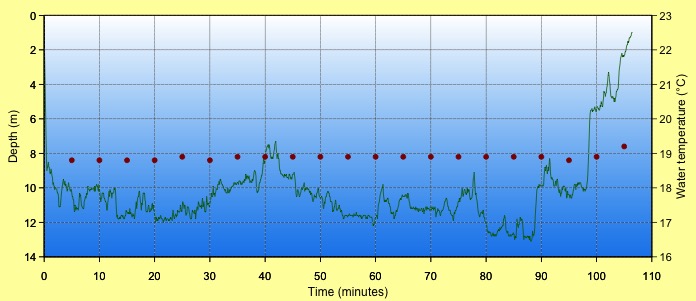
Tides at Botany Bay AEDT
Note that tides at dive site may vary from above location.
High
6:19am
1.57m
Low
12:24pm
0.46m
High
6:30pm
1.61m
Details
I thought it was going to be a large group of us diving at The Monument today but it turned out to be just Dom and me. Mandy was going to come and show us Pygmy Playground but she pulled out of the dive, vowing to show us tomorrow. I had been looking forward to seeing Pygmy Playground as I've not seen a pygmy pipehorse at The Monument since 21 July and that was just the one on the shelf at the start of the East-West Wall.
Dom and I walked around to the easy entry point around a third of the way to The Steps. The tide was still quite low and we had to wade out to the edge of the platform. Once we were ready we descended and headed towards the sand line. The current was quite strong and we ended up at Block Rock before we reached the sand line. The visibility was between 5 and 10 metres and the water temperature was around 19°C.
I had a good look over the sponge covered rock next to Block Rock before headed towards Sutherland Point.
I didn't find anything of interest until we were part way along the deep wall. I found the Dwarf Lionfish in one of the orange finger sponges. I'll have to check how long it has been there but it is over a year and maybe more than 2.
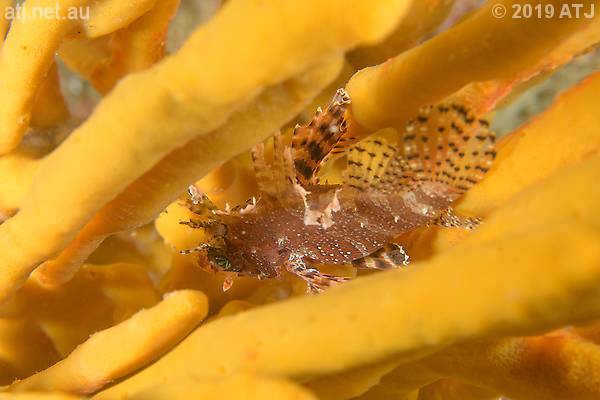
Dwarf Lionfish, Dendrochirus brachypterus. 11.2m.
I swam straight up to the sea tulips on the wall and spotted "Jason", the Pot-bellied Seahorse, in the sponge next to it. I'm glad he's still around. I took some photographs and pointed him out to Dom. I had a hunt around for more seahorses, in particular a female, but found none. There was a Reaper Cuttlefish on the adjacent rock.
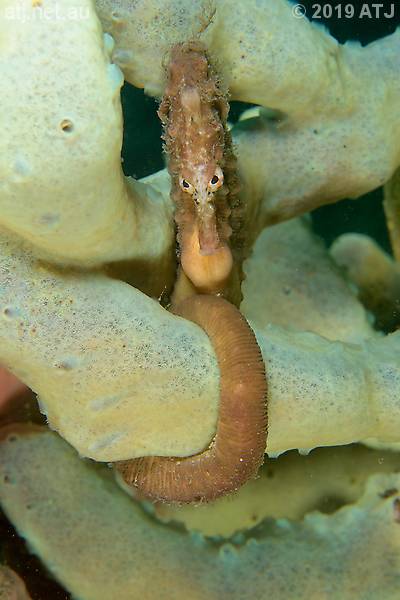
Male Pot-bellied Seahorse, Hippocampus abdominalis, ("Jason"). 10.1m.
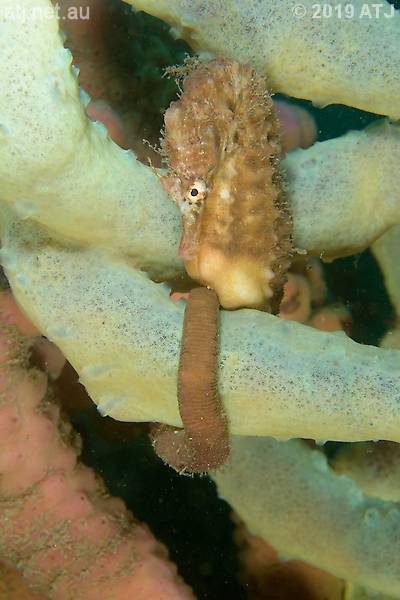
Male Pot-bellied Seahorse, Hippocampus abdominalis, ("Jason"). 10m.
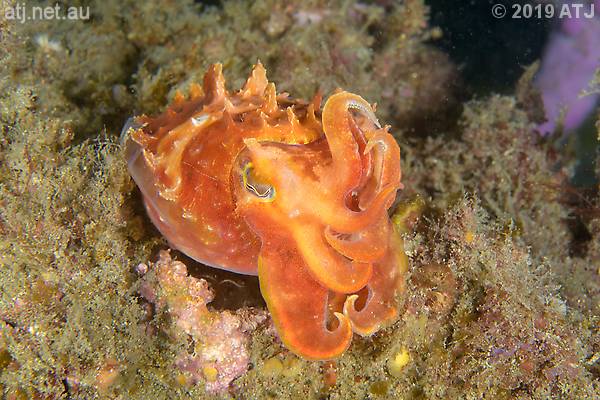
Reaper Cuttlefish, Sepia mestus. 10.6m.
I spotted a Weedy Seadragon in the kelp. When I got closer I realised it was a male with eggs. The eggs were quite old and covered in algae. I pointed it out to Dom and continued along the wall.
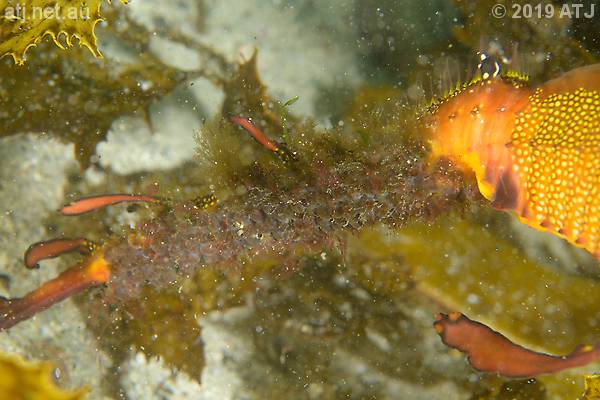
Eggs on the tail of a male Weedy Seadragon, Phyllopteryx taeniolatus. 11.8 m.
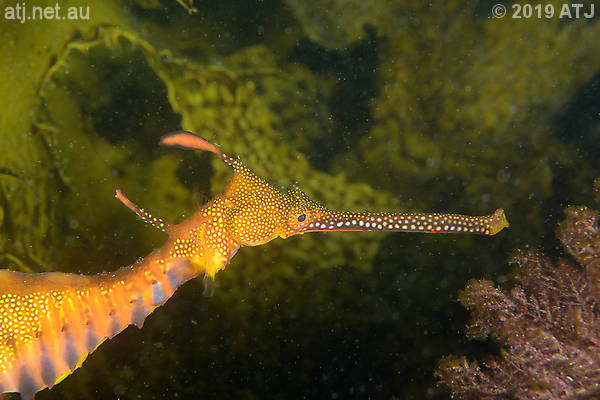
Weedy Seadragon, Phyllopteryx taeniolatus. 11.4m.
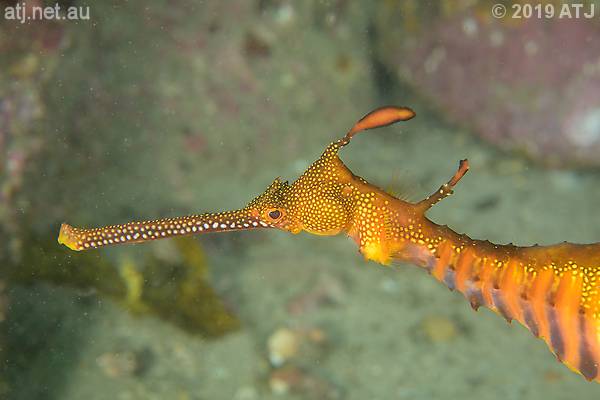
Weedy Seadragon, Phyllopteryx taeniolatus. 11.6m.
I checked out the end of the wall hoping to find an anglerfish or more seahorses but found nothing. I also looked on the rocks below the wall for pygmy pipehorses.
I continued to Carijoa Rock, which seems to have more algae on it now than Carijoa. I spotted another male Weedy Seadragon with eggs just down from Carijoa Rock. His eggs were new. Dom caught up and I pointed out the weedy.
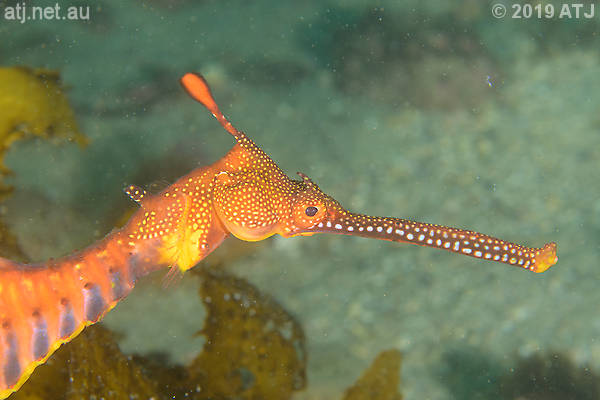
Weedy Seadragon, Phyllopteryx taeniolatus. 12m.
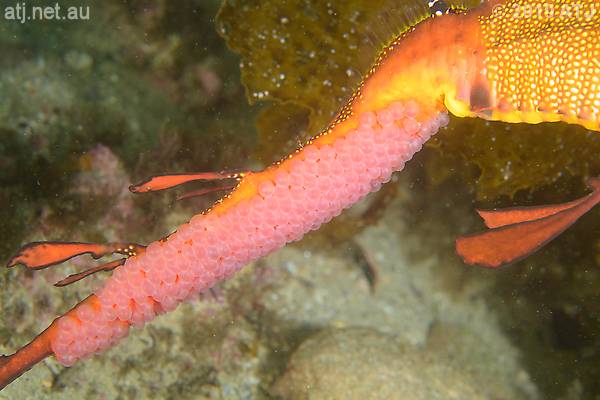
Eggs on the tail of a male Weedy Seadragon, Phyllopteryx taeniolatus. 11.9 m.
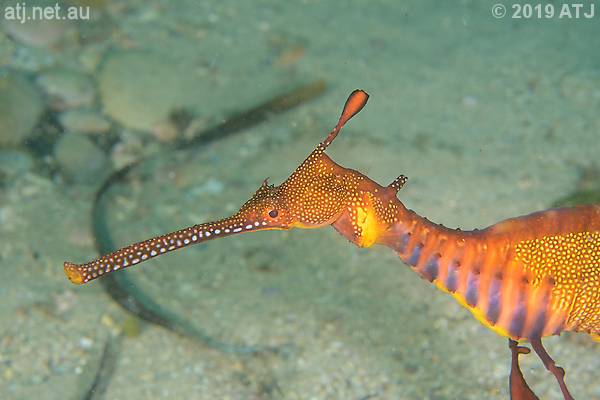
Weedy Seadragon, Phyllopteryx taeniolatus. 11.8m.
As I was heading back to Carijoa Rock I spotted a smallish Crested Horn Shark. I was about to take some photographs of it when I spotted a Clown Toby so I pursued it instead.
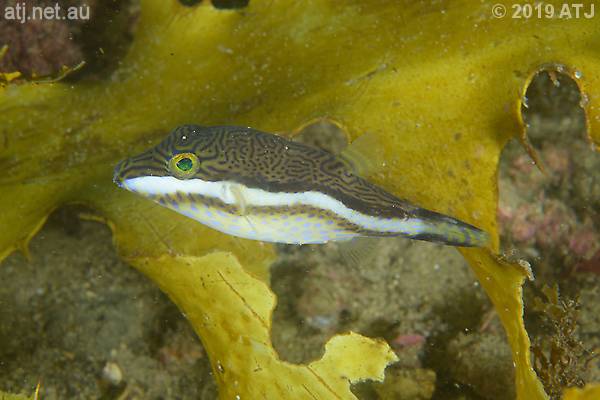
Clown Toby, Canthigaster callisterna. 11.8m.
Back at Carijoa Rock I spotted two Nembrotha purpureolineata nudibranchs. They were around 30 centimetres apart. When Dom swam up I pointed them out and he indicated there was another one back towards the wall. I photographed that one as well.
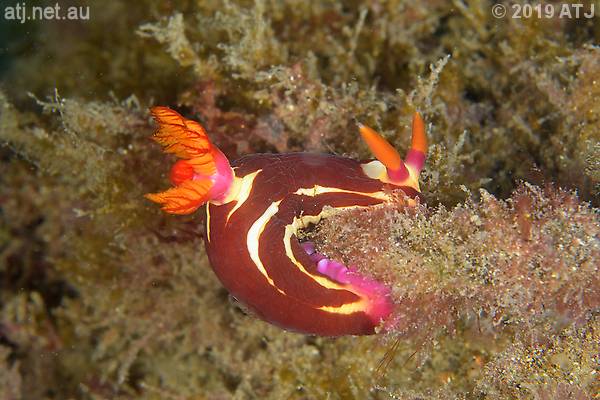
Nudibranch, Nembrotha purpureolineata. 11.2m.
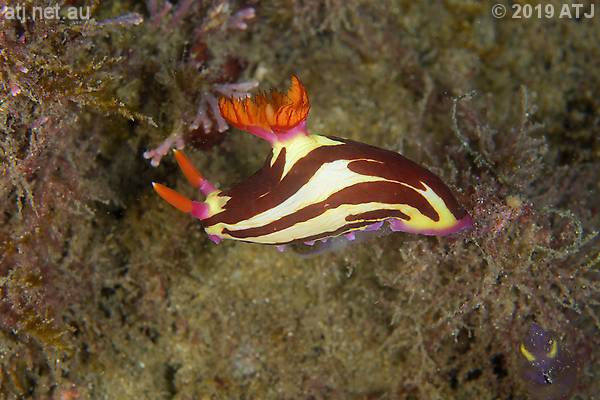
Nudibranch, Nembrotha purpureolineata. 11.4m.
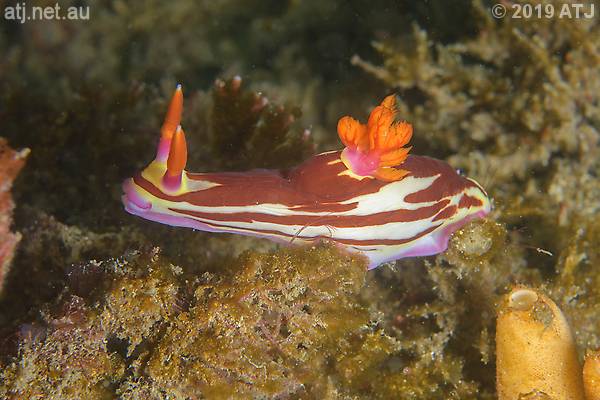
Nudibranch, Nembrotha purpureolineata. 11.4m.
We headed up to the main reef from Carijoa Rock. I looked carefully on all the rocks, including Slope Rock for pygmies, but found none. Pygmy Playground must be around here. Both Mandy and Ves have found over 10 pygmies on the same rock but I can't work out why I can't find it.
We headed up to Seahorse Rock. I had a quick look for seahorses and then looked for the Nembrotha purpureolineata nudibranch that lives near Seahorse Rock. I spotted it on an ascidian and took some photographs. (When I looked at the photographs on the computer, I realised there was also a clingfish, two anemones, and a sea spider on the ascidian.) I pointed out the nudibranch to Dom and then headed down to the slope below Seahorse Rock.
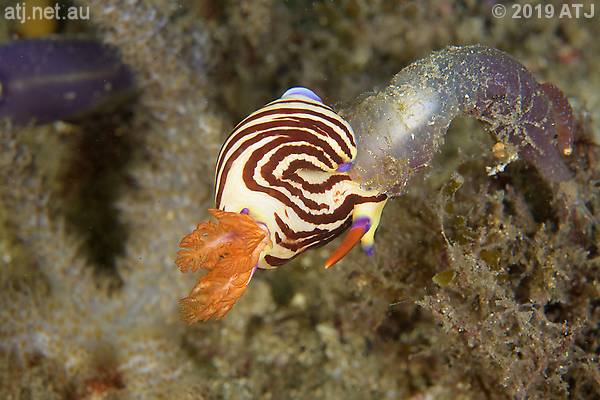
Nudibranch, Nembrotha purpureolineata. 8.3m.
I looked along the slope hoping to spot a White's Seahorse but instead found an orange Red-fingered Anglerfish. It was in a sort of non-obvious spot but once I'd seen it it was hard to miss. The strong current made photography difficult. When Dom swam down I pointed it out.
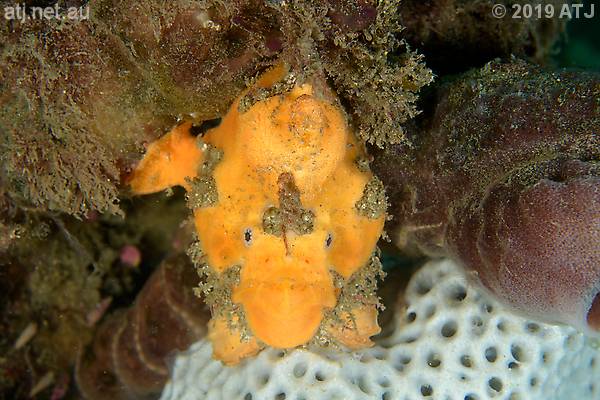
Red-fingered Anglerfish, Porophryne erythrodactylus. 9.4m.
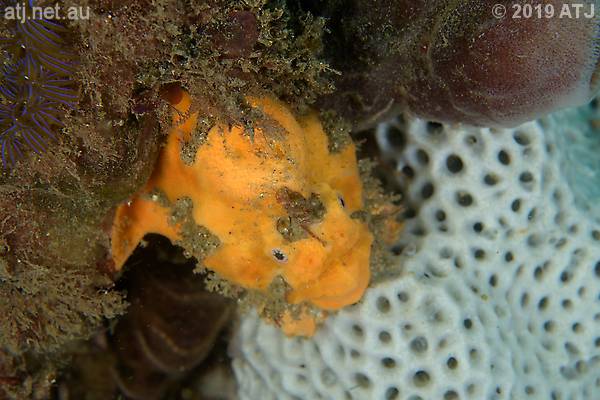
Red-fingered Anglerfish, Porophryne erythrodactylus. 9.4m.
I continued to check out all the rocks for pygmy pipehorses and was growing increasingly frustrated in not being able to find any.
I looked closely at Split Rock. I was hoping to find the Doughboy Scallop that I had seen on 21 July but it must have moved on. I then checked the next few rocks for pygmy pipehorses. I have seen them here before. While checking the low rock with the purple sponge I spotted a tiny juvenile pygmy pipehorse (IL2019112301). Finally! I took some photographs, including one with my finger for scale. I showed it to Dom who had a hard time seeing it.
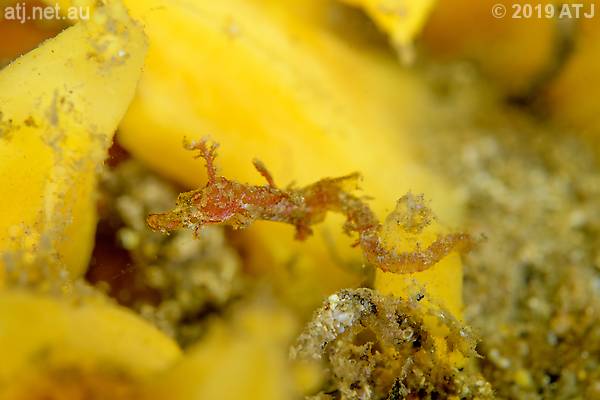
Juvenile Sydney Pygmy Pipehorse, Idiotropiscis lumnitzeri, (IL2019112301). 11.6m.
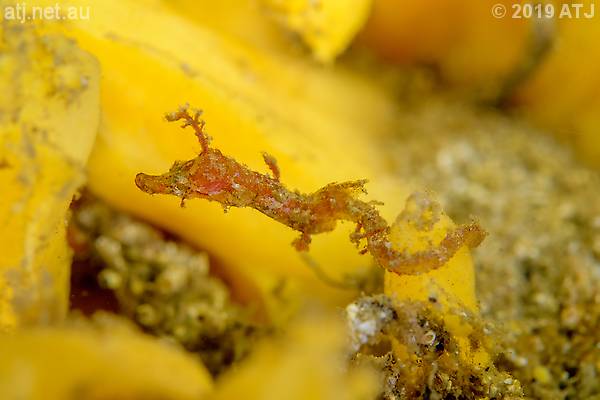
Juvenile Sydney Pygmy Pipehorse, Idiotropiscis lumnitzeri, (IL2019112301). 11.6m.
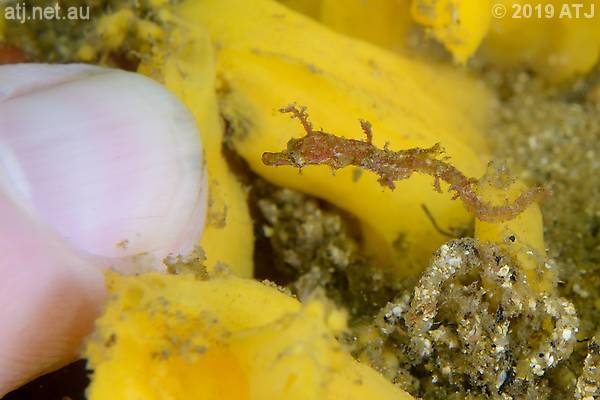
Juvenile Sydney Pygmy Pipehorse, Idiotropiscis lumnitzeri, (IL2019112301). 11.6m.
We continued along the reef and I continued my search for pygmy pipehorses. It was easy going as the current carried us. I spotted an Elysia ornata sea hare while I was looking.
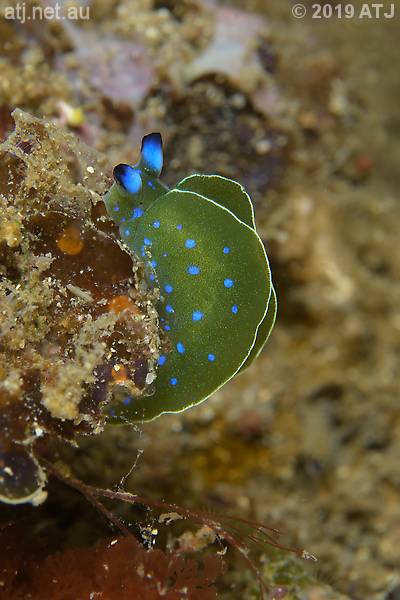
Sea hare, Elysia ornata. 10.5m.
I was looking at the rock with the large Dendronephthya when I spotted a pink female pygmy pipehorse (IL2019112302). Further success! I then hunted for a male and found him (IL2019112303), too. So, I'm not broken. I can find pygmy pipehorses at The Monument. The current was rather strong which made photography difficult. Dom caught up and I showed them to him.
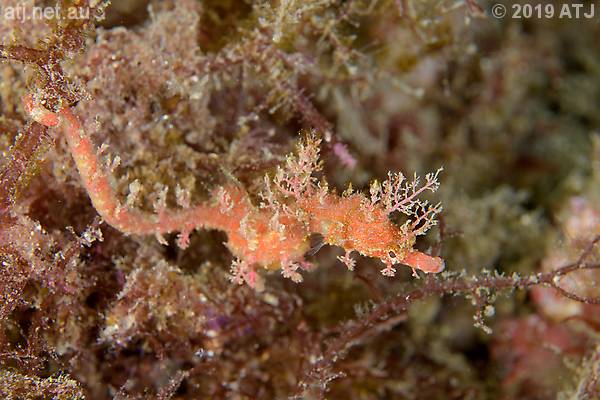
Female Sydney Pygmy Pipehorse, Idiotropiscis lumnitzeri, (IL2019112302). 11.2m.
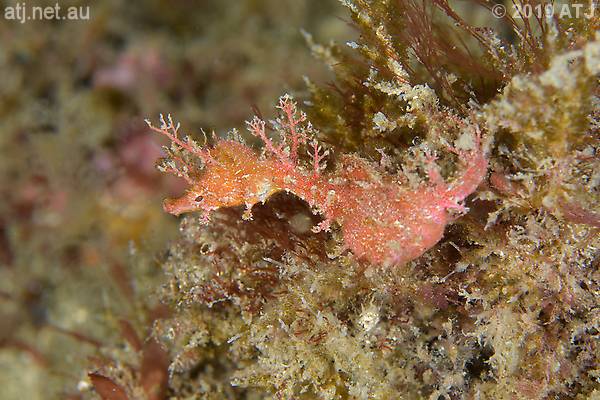
Male Sydney Pygmy Pipehorse, Idiotropiscis lumnitzeri, (IL2019112303). 11.2m.
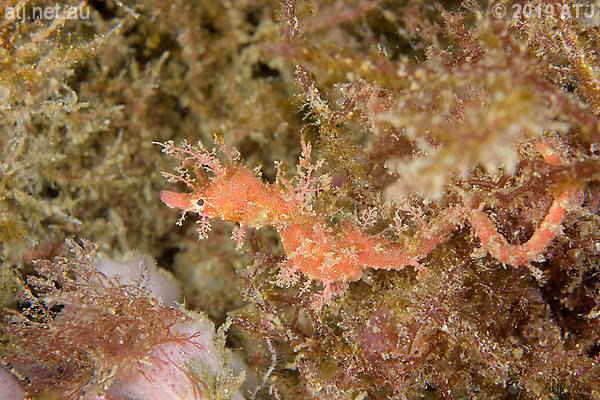
Female Sydney Pygmy Pipehorse, Idiotropiscis lumnitzeri, (IL2019112302). 11.2m.
I looked around the area for my pygmies and also anglerfishes, checking in all the usual spots, but found none.
We headed to the Valley of the Pygmies. I spotted a female Weedy Seadragon on the sand. I took some photographs and then Dom called me back to point out a Green Moray he'd found. We then went back to the weedy to discover there were actually two. I wasn't sure which one I'd already photographed so I took a punt on one - and then took a few shots of the other for safety although I had it right.
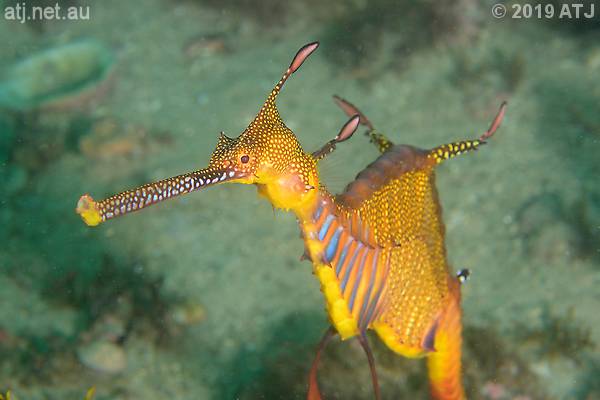
Weedy Seadragon, Phyllopteryx taeniolatus. 12.5m.
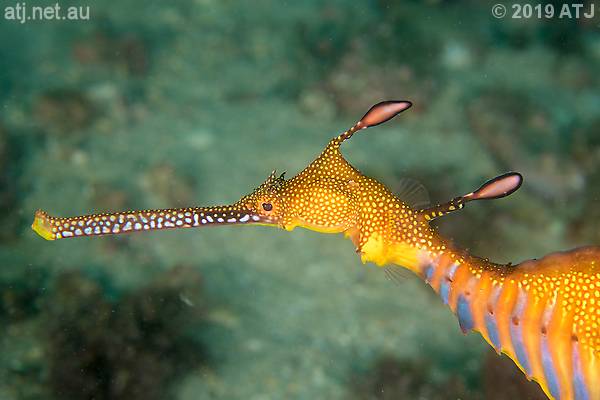
Weedy Seadragon, Phyllopteryx taeniolatus. 12.7m.
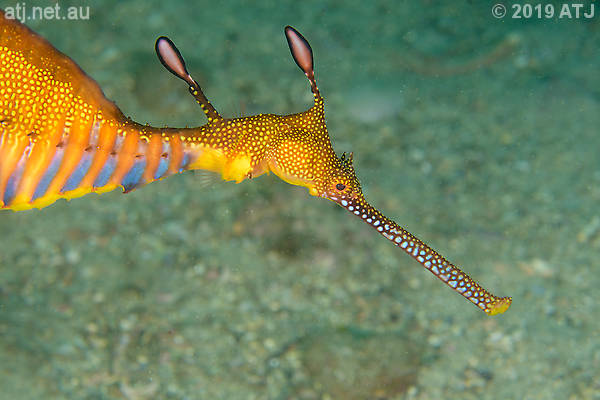
Weedy Seadragon, Phyllopteryx taeniolatus. 12.7m.
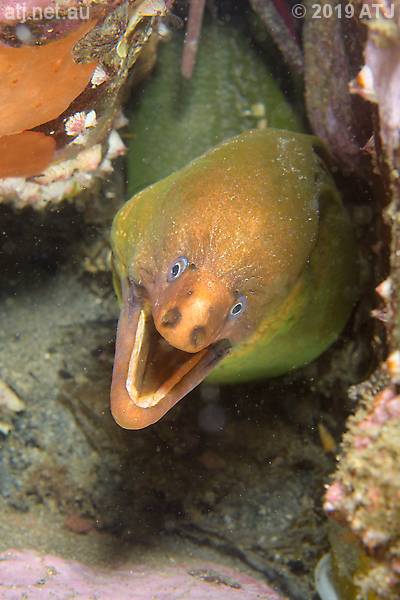
Green Moray, Gymnothorax prasinus. 11.7m.
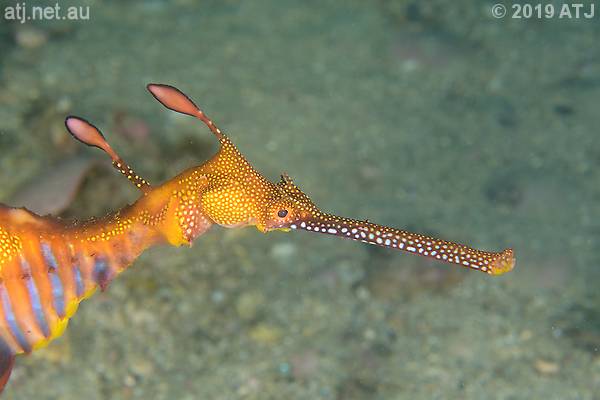
Weedy Seadragon, Phyllopteryx taeniolatus. 12.8m.
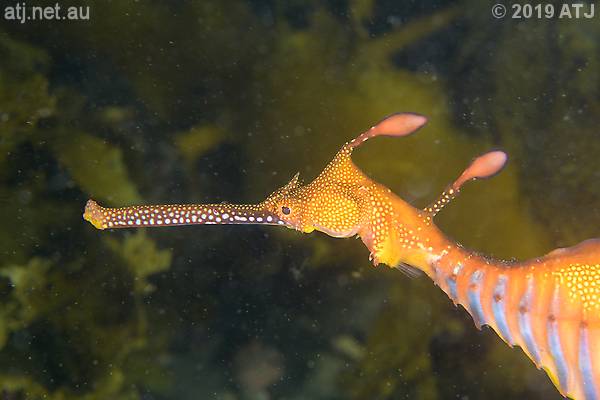
Weedy Seadragon, Phyllopteryx taeniolatus. 12.7m.
Dom was low on air so he left me. I, too, was starting to get low but still want to look for the male Weedy Seadragons with eggs I'd seen here 2 weeks ago. I swam along the base of the wall and came across one of the male. His eggs were now quite old. I wanted to look for the other but wouldn't have enough air to also check for "Tim", the Pot-bellied Seahorse, along the East-West Wall.
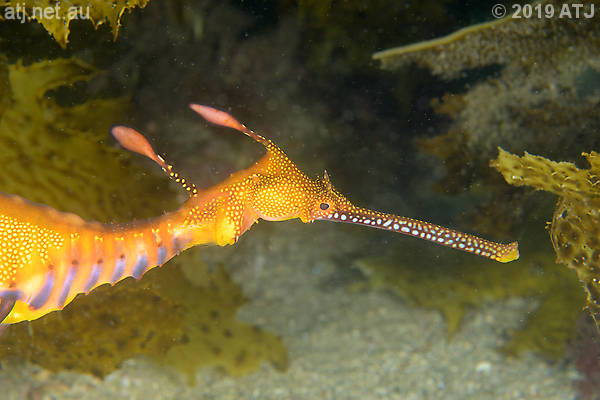
Weedy Seadragon, Phyllopteryx taeniolatus. 12.9m.
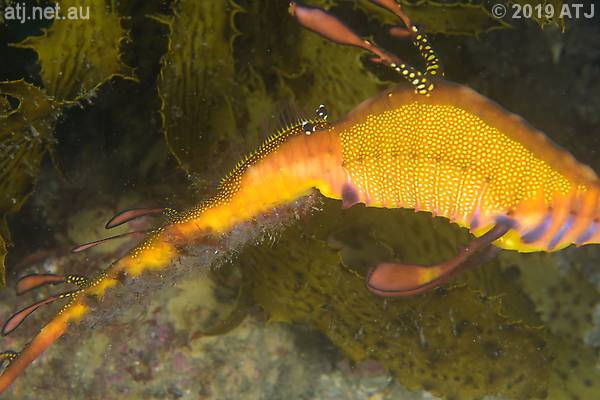
Eggs on the tail of a male Weedy Seadragon, Phyllopteryx taeniolatus. 12.9 m.
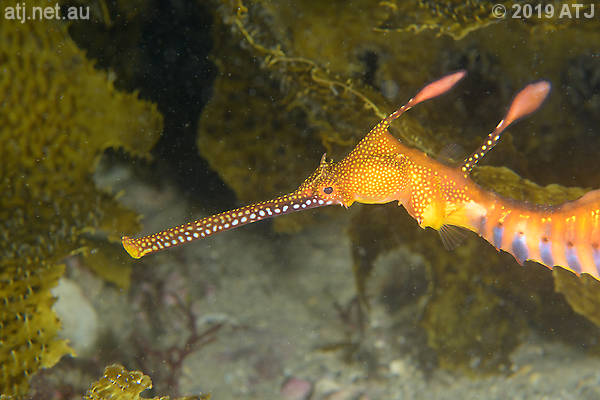
Weedy Seadragon, Phyllopteryx taeniolatus. 12.8m.
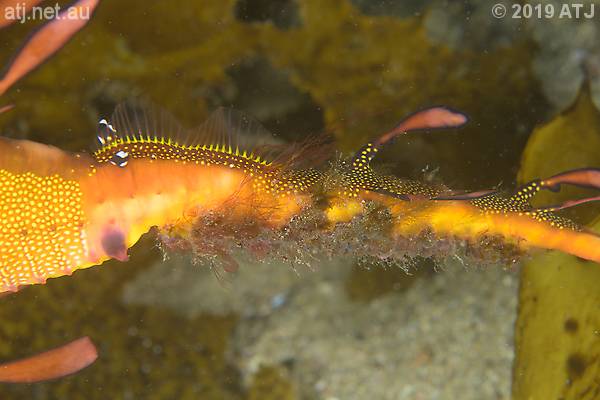
Eggs on the tail of a male Weedy Seadragon, Phyllopteryx taeniolatus. 13 m.
I headed up the end NW-SE Wall towards the corner. I swam straight into another orange Red-fingered Anglerfish.
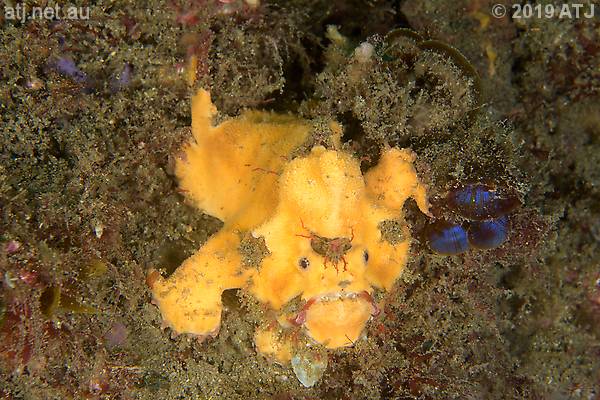
Red-fingered Anglerfish, Porophryne erythrodactylus. 9.9m.
I continued to the start of the East-West Wall. I had a quick look on the large Carijoa covered rock for anglerfish, and then a quick half-arsed look on the shelf for pygmies.
I swam along the base of the East-West Wall until the area where there are lots of orange finger sponges. This is where I had first seen "Tim". I looked around but couldn't find him. I was about to give up when I spotted the sea tulips where I last saw him. He wasn't there but I spotted him in an orange finger sponge next to a white honeycomb sponge nearby.
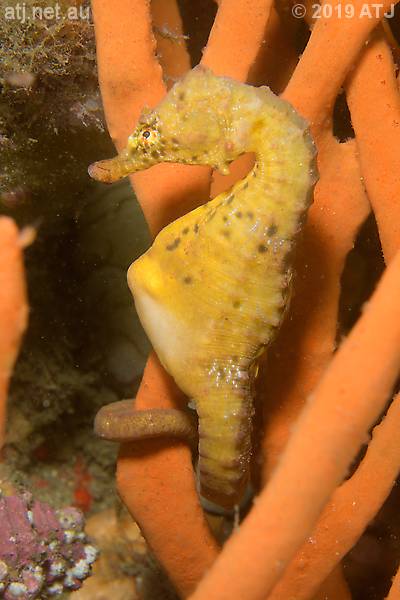
Male Pot-bellied Seahorse, Hippocampus abdominalis, ("Tim"). 10.1m.
I was now very low on air so I headed to the top of the wall and started my safety stop as I swam along the top of the wall. As I swam I nearly crashed into a huge stingray that swam across in front of me. I then noticed an Green Spoon Worm out of the sand. I assume it was dead as it shouldn't be out in the open.
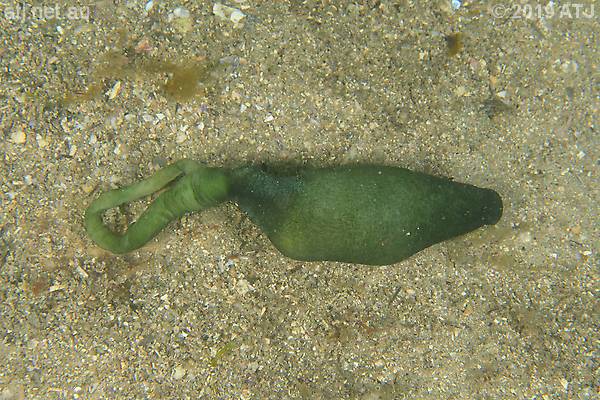
Green Spoon Worm, Metabonellia haswelli. 5.3m.
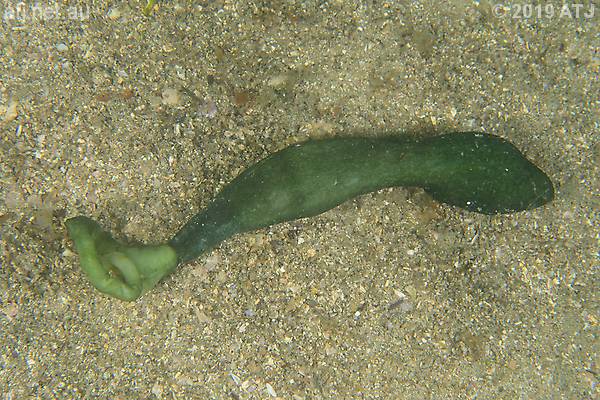
Green Spoon Worm, Metabonellia haswelli. 5.3m.
Once I finished my safety stop I turned south and kept swimming until it was too shallow. I stood up and waded out onto the rocks just inside the point.
Camera gear
Camera
Nikon D500
Lens
Nikon AF-S Micro Nikkor 60mm f/2.8G ED
Housing
Ikelite 6812.5
Lens port
Ikelite Flat Port 5502.41
Strobe(s)
2 x Ikelite SubStrobe DS161